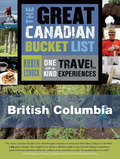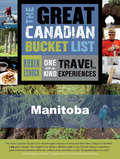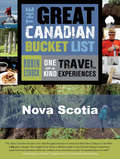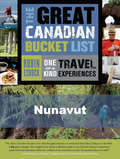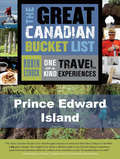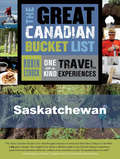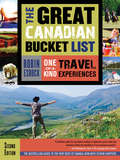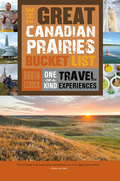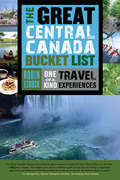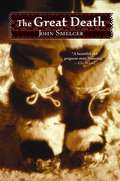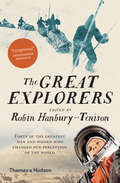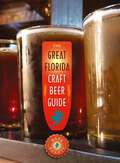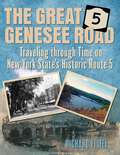- Table View
- List View
The Great American Staycation: How to Make a Vacation at Home Fun for the Whole Family (and Your Wallet!)
by Matt WixonLayoffs are rampant, gas prices are volatile, airlines are cutting flights, and Americans are feeling the economic pinch of a recession. As much as we hate it in this country of big dreams, big cars and Big Macs, we have to find a way to cut back. For many Americans, that means turning the Great American Vacation into a “staycation,” which is the big buzzword of the year, having appeared in articles everywhere from www.CNN.com to Newsweek. But what does a staycation really mean? Newspaper humor columnist and frequent staycationer Matt Wixon shares with readers the definition of a staycation as well as:Rules for a successful, satisfying vacation at home or nearbyMotivation and encouragement for people who can’t afford the big, traditional vacationWays to make the most of time off from workStrategies and experiences from more than a dozen staycationers, as well as hundreds of Internet links and specific ideas to help plan a vacation in your hometown.From alternatives to destination theme parks to making the most of out local amenities to reigniting the flame in a relationship, Americans will find this guide a humorous and invaluable guide to staying home on vacation.
The Great Atlantic Canada Bucket List: One-of-a-Kind Travel Experiences
by Robin EsrockMost Canadians think of travel as a way to escape the snow, cold, and dreary winter skies. But Robin Esrock loves all that our eastern provinces have to offer visitors, and so will you! The Great Atlantic Canada Bucket List highlights the best travel experiences to be had on Canada’s East Coast. Not your typical travel guide, Robin’s recommendations encompass outdoor adventure and natural wonders as well as the unique food, culture, and history of the Maritimes. Categorized by province, The Great Atlantic Canada Bucket List will give you a first-hand perspective on: • Ziplining over a waterfall in New Brunswick. • Harvesting an iceberg for a Newfoundland cocktail. • Exploring Nova Scotia’s Cabot Trail. • Walking the seabed beneath Hopewell Rocks. • Cycling across Canada’s island province. • Rafting a tidal wave in the Bay of Fundy.
The Great Canadian Bucket List — Alberta
by Robin EsrockOn his personal quest to check off the best of his home country, travel writer and host Robin Esrock catalogues must-sees, including nature, food, culture, history, adrenaline rushes, and quirky Canadiana. After spending years crafting the definitive Canadian Bucket List, he’s packed in enough for a lifetime, at least. In this special excerpt, Esrock takes us to the wild west and Alberta’s wide-open spaces and majestic peaks, including such experiences as: the Calgary Stampede, riding the Rocky Mountaineer train, hunting for dinosaurs, and skiing a UNESCO World Heritage Site.
The Great Canadian Bucket List — British Columbia
by Robin EsrockOn his personal quest to check off the best of his home country, travel writer and host Robin Esrock catalogues must-sees, including nature, food, culture, history, adrenaline rushes, and quirky Canadiana. After spending years crafting the definitive Canadian Bucket List, he’s packed in enough for a lifetime, at least. In this special excerpt, Esrock takes us to Canada’s temperate, laid-back and culturally rich Left Coast and such fabulous experiences as: diving in a sunken battleship, sailing in Haida Gwaii, exploring and old-growth forest, tasting the Okanagan, and snorkelling with salmon.
The Great Canadian Bucket List — Manitoba
by Robin EsrockOn his personal quest to check off the best of his home country, travel writer and host Robin Esrock catalogues must-sees, including nature, food, culture, history, adrenaline rushes, and quirky Canadiana. After spending years crafting the definitive Canadian Bucket List, he’s packed in enough for a lifetime, at least. In this special excerpt, Esrock takes us to the diverse landscapes and cultures of Manitoba, a land of extreme beauty where cultures blend. Experiences include: Winnipeg’s huge folk music festival, the Royal Winnipeg Ballet, seeing polar bears from a tundra buggy, and experiencing the life of the voyageurs.
The Great Canadian Bucket List — New Brunswick
by Robin EsrockOn his personal quest to check off the best of his home country, travel writer and host Robin Esrock catalogues must-sees, including nature, food, culture, history, adrenaline rushes, and quirky Canadiana. After spending years crafting the definitive Canadian Bucket List, he’s packed in enough for a lifetime, at least. In this special excerpt, Esrock takes us the east coast and the ancient Acadian land of New Brunswick, including such experiences as: walking the seabed, ziplining over a waterfall, biking in a kilt, and drinking a potato smoothie!
The Great Canadian Bucket List — Newfoundland and Labrador
by Robin EsrockOn his personal quest to check off the best of his home country, travel writer and host Robin Esrock catalogues must-sees, including nature, food, culture, history, adrenaline rushes, and quirky Canadiana. After spending years crafting the definitive Canadian Bucket List, he’s packed in enough for a lifetime, at least. In this special excerpt, Esrock takes us what is perhaps Canada’s most distinct place, where Celtic culture thrives in some of Canada’s must rugged wilderness. Experiences include: watching the sun rise on a continent, sleeping in a lighthouse, driving the Trans-Labrador Highway, and making an iceberg cocktail.
The Great Canadian Bucket List — Northwest Territories
by Robin EsrockOn his personal quest to check off the best of his home country, travel writer and host Robin Esrock catalogues must-sees, including nature, food, culture, history, adrenaline rushes, and quirky Canadiana. After spending years crafting the definitive Canadian Bucket List, he’s packed in enough for a lifetime, at least. In this special excerpt, Esrock takes us to the one of the largest, emptiest, most beautiful places in the world: the arctic plains of the Northwest Territories. Experiences include: watching the northern lights, exploring Canada’s largest national park, rafting the Nahanni, and hooking a northern pike.
The Great Canadian Bucket List — Nova Scotia
by Robin EsrockOn his personal quest to check off the best of his home country, travel writer and host Robin Esrock catalogues must-sees, including nature, food, culture, history, adrenaline rushes, and quirky Canadiana. After spending years crafting the definitive Canadian Bucket List, he’s packed in enough for a lifetime, at least. In this special excerpt, Esrock takes us to legendary Nova Scotia, land of a thriving and rich culture amid the crashing waves of the Atlantic shore, and such experiences as: walking around historic Lunenburg, exploring the Cabot Trail, and rafting a tidal wave.
The Great Canadian Bucket List — Nunavut
by Robin EsrockOn his personal quest to check off the best of his home country, travel writer and host Robin Esrock catalogues must-sees, including nature, food, culture, history, adrenaline rushes, and quirky Canadiana. After spending years crafting the definitive Canadian Bucket List, he’s packed in enough for a lifetime, at least. In this special excerpt, Esrock takes us to the remote heart of Canada’s Inuit culture, a land of long winters, polar bears, and vast distances, for some amazing experiences, including: swimming in an Arctic waterfall, hiking in the tundra, fishing for Arctic char, and watching belugas play in a river mouth.
The Great Canadian Bucket List — Ontario
by Robin EsrockOn his personal quest to check off the best of his home country, travel writer and host Robin Esrock catalogues must-sees, including nature, food, culture, history, adrenaline rushes, and quirky Canadiana. After spending years crafting the definitive Canadian Bucket List, he’s packed in enough for a lifetime, at least. In this special excerpt, Esrock takes us to the great variety of Ontario, from Canada’s largest city to the nation’s capital to the beauty of the province’s vast wilderness, in search of great experiences such as: leaning off the CN Tower skywalk, getting sprayed in Niagara Falls, visiting the great museums of Ottawa, and motorbiking around Lake Superior.
The Great Canadian Bucket List — Prince Edward Island
by Robin EsrockOn his personal quest to check off the best of his home country, travel writer and host Robin Esrock catalogues must-sees, including nature, food, culture, history, adrenaline rushes, and quirky Canadiana. After spending years crafting the definitive Canadian Bucket List, he’s packed in enough for a lifetime, at least. In this special excerpt, Esrock takes us to Canada’s smallest province, an island with its own flavour that’s about much, much more than potatoes and Green Gables. Experiences include: hauling a lobster trap, harvesting sea plants, and shucking oysters.
The Great Canadian Bucket List — Quebec
by Robin EsrockOn his personal quest to check off the best of his home country, travel writer and host Robin Esrock catalogues must-sees, including nature, food, culture, history, adrenaline rushes, and quirky Canadiana. After spending years crafting the definitive Canadian Bucket List, he’s packed in enough for a lifetime, at least. In this special excerpt, Esrock takes us to "La Belle Province", a distinct land of rich city culture and time-honoured rural traditions, set against the backdrop of a vast wilderness. Experiences include: discovering historic Quebec City, scaling a frozen waterfall, spending a night in an ice hotel, and finding Montreal’s best smoked meat sandwich.
The Great Canadian Bucket List — Saskatchewan
by Robin EsrockOn his personal quest to check off the best of his home country, travel writer and host Robin Esrock catalogues must-sees, including nature, food, culture, history, adrenaline rushes, and quirky Canadiana. After spending years crafting the definitive Canadian Bucket List, he’s packed in enough for a lifetime, at least. In this special excerpt, Esrock takes us to wide-open prairies, the land of wheat kings and the endless blue sky, Saskatchewan, including such one-of-a-kind experiences as: the intensity of Roughrider football nation, horse riding with bison, exploring North America’s largest sand dune, and floating in Canada’s dead sea.
The Great Canadian Bucket List — Yukon
by Robin EsrockOn his personal quest to check off the best of his home country, travel writer and host Robin Esrock catalogues must-sees, including nature, food, culture, history, adrenaline rushes, and quirky Canadiana. After spending years crafting the definitive Canadian Bucket List, he’s packed in enough for a lifetime, at least. In this special excerpt, Esrock takes us to the land of the gold rush and the midnight sun, from vibrant Yellowknife to the peaks and the tundra: The Yukon. Experiences include: dogsledding, driving the Dempster Highway, panning for gold, and swallowing the sour toe cocktail!
The Great Canadian Bucket List: One-of-a-Kind Travel Experiences
by Robin EsrockA National Bestseller! Fully revised with new chapters and fascinating destinations to explore, renowned travel writer Robin Esrock guides you to Canada’s most incredible experiences. Having visited more than 100 countries on 7 continents, Robin Esrock has built a career chasing the extraordinary. His bestselling Bucket List books feature experiences that are entirely unique, instantly memorable, wholly inspirational, and available to all. Celebrating his adopted home of Canada, Robin journeys to every province and territory to reveal the remarkable activities and destinations that are unique to the True North strong and free. Get ready to: Cross the mythical Northwest Passage Cycle across Prince Edward Island Float on Canada’s very own Dead Sea Feel the hot breath of a wild polar bear Cave bash along Quebec’s Magdalen Islands Sail among whales in the “Galapagos of the North” Taste Canada’s best poutine, smoked meat, and fish and chips Raft a tidal wave, roll your car uphill, camp in the Arctic and much more! Robin packs each chapter with colourful descriptions, unforgettable characters, quirky trivia, and eye-popping photography. With more than 70 exciting new experiences, the new edition unlocks an extensive online companion where you’ll find videos, galleries, maps, reading guides, and all the practical information you’ll need to follow in Robin’s footsteps.
The Great Canadian Prairies Bucket List: One-of-a-Kind Travel Experiences
by Robin EsrockFrom Robin Esrock, author of The Great Canadian Bucket List, comes a look at the best that Canada’s prairies have to offer. Having travelled to over one hundred countries on six continents, international travel guru and bestselling author Robin Esrock turns his attention to the Canadian prairies. Robin spent years personally discovering these one-of-a-kind destinations and activities you have to try in Manitoba and Saskatchewan: Float in “Canada’s Dead Sea” Track polar bears along Hudson Bay Horse-ride through herds of free-roaming bison Uncover ancient archaeological mysteries in Winnipeg Learn what it takes to join the Royal Canadian Mounted Police Witness the largest gathering of snakes in the world Party with the wildest sports fans in Canada Bask on a tropical beach — on a prairie lake Bundled with an extensive up-to-date companion website, The Great Canadian Prairies Bucket List provides all the inspiration and information you’ll need to follow in his footsteps.
The Great Central Canada Bucket List: One-of-a-Kind Travel Experiences
by Robin EsrockMost Canadians think of travel as a way to escape the snow, cold, and dreary winter skies. But Robin Esrock loves all that the provinces of Ontario and Quebec have to offer visitors, and so will you! The Great Central Canada Bucket List highlights the best travel experiences to be had in the heart of Canada. Renowned travel writer and TV host Robin Esrock explored every inch of central Canada to craft the definitive Bucket List for the region. Running the gamut of nature, food, culture, history, adrenaline rushes, and quirky Canadiana, Robin’s personal quest to tick off the very best of Ontario and Quebec packs in enough for a lifetime. The Great Central Canada Bucket List provides a first-hand perspective on: Riding a motorcycle around Lake Superior. Drinking caribou with Bonhomme. Unravelling a mystery in Algonquin Park. Spending the night at an ice hotel. Scaling the via ferrata at Mont-Tremblant. Exploring the great museums. Cave-swimming in the Magdalen Islands
The Great Christmas Escape
by Kellie HailesIt's time to swap mistletoe and mince pies for the adventure of a lifetime! Sara's life has been in a bit of a rut. Lately, her job as a photographer has just meant taking photos of happy couples and families all day before returning to her empty flat. And while she normally loves Christmas with her family, this year a part of her just wants to run away. So when her ex-husband Fin gets in touch with a wild idea - a joint work trip to New Zealand - she knows it's crazy... but she says yes!A celebrated travel blogger, Fin has made a career out of following his bliss. As much as he loves Sara, the steady family life she's always wanted is not one he can give her. This trip together is his one chance to win her back. But can he convert her to his impulsive lifestyle? There's only one way to find out. As the two explore the stunning sights and thrills of New Zealand, they're about to discover there's so much more to each other than they ever realised...A Christmas romcom like no other, The Great Christmas Escape by Kellie Hailes is the perfect getaway read this year...
The Great Christmas Escape
by Kellie HailesIt's time to swap mistletoe and mince pies for the adventure of a lifetime! Sara's life has been in a bit of a rut. Lately, her job as a photographer has just meant taking photos of happy couples and families all day before returning to her empty flat. And while she normally loves Christmas with her family, this year a part of her just wants to run away. So when her ex-husband Fin gets in touch with a wild idea - a joint work trip to New Zealand - she knows it's crazy... but she says yes!A celebrated travel blogger, Fin has made a career out of following his bliss. As much as he loves Sara, the steady family life she's always wanted is not one he can give her. This trip together is his one chance to win her back. But can he convert her to his impulsive lifestyle? There's only one way to find out. As the two explore the stunning sights and thrills of New Zealand, they're about to discover there's so much more to each other than they ever realised...A Christmas romcom like no other, The Great Christmas Escape by Kellie Hailes is the perfect getaway read this year...
The Great Danbury State Fair (Landmarks Ser.)
by Andrea ZimmermannThe first Danbury Fair was held under a borrowed tent in 1869. Over the next 112 years, the fair expanded to a ten-day event, earning a national reputation for its themed villages, giant figures, grandstand shows and wildly popular stock car races. The twelve formal venues for music and entertainment on the fairground included the World of Mirth Theater and the Orange Bowl Stadium. Under the management of oil magnate John W. Leahy, the fair retained its great hometown appeal as city dwellers flocked to the fair by the thousands. Venture back to the autumn days of zany ostrich races and Zembruski's polka music with Andrea Zimmermann as she explores the beloved bygone tradition of the Great Danbury State Fair.
The Great Death
by John SmelcerSet in 1917 Alaska, this novel chronicles the story of two sisters who survive a terrible plague that takes over their village. Struggling to overcome the obstacles nature throws their way, the girls discover that their true strength lies in their love for each other.
The Great Explorers: The Brave Adventurers Who Risked Their Lives To Understand How Our Planet Works (All You Need To Know Ser.)
by Robin Hanbury-TenisonPenetrating biographies written by a group of distinguished travel writers, broadcasters, and historians reveal the lives, motives, and passions of forty major explorers in history. It has always been mankind’s gift, or curse, to be inquisitive, and through the ages people have been driven to explore the limits of the worlds known to them—and beyond. Here are the stories of forty of the world’s greatest explorers from Europe, America, Asia, and Australia. These are men and women who changed our perception of the world through their courageous adventures. Organized thematically, the book opens with the oceanic journeys of five hundred years ago, when the great era of recorded exploration began. The following sections look at The Land, Rivers, Polar Ice, Deserts, Life on Earth, and New Frontiers. Many of these explorers recounted their journeys in vivid firsthand accounts; others were superb artists or photographers. The book features quotes from their journals and reports, and it is illustrated with paintings, photographs, engravings, and maps, so that we can experience their adventures through their own eyes and in their own words. Featured explorers include: Christopher Columbus, Vasco da Gama, James Cook, Lewis and Clark, Richard Burton, Samuel de Champlain, David Livingstone, Roald Amundsen, Gertrude Bell, Alexander von Humboldt, Yuri Gagarin, and Jacques-Yves Cousteau.
The Great Florida Craft Beer Guide
by Mark DeNoteOnce considered a wasteland by beer connoisseurs, Florida recently awakened to the craft beer phenomenon. Finally, “good beer” can be found throughout the state, and enthusiasts are flocking to tasting rooms to meet friends for a pint or fill their growlers. The Great Florida Craft Beer Guide is all you need to find local, distinctive beer wherever you are in the Sunshine State.Longtime craft beer columnist Mark DeNote takes you on a tour from Destin to Key West, from award-winning breweries to hidden tasting rooms, from hefeweizens and pale ales to saisons and stouts. Through exclusive interviews with brewers and owners, he shares the stories of their foundings, their brewing philosophies and methods, and insider tips about each brewery’s staple and seasonal beers. DeNote not only provides unparalleled access to the breweries but also offers an enlightening history of Florida brewing that includes forgotten establishments like Jacksonville Brewing Company, Orlando’s Atlantic, and Miami’s Flamingo.Whether you’re a local or a tourist, a newbie or a beer snob, The Great Florida Craft Beer Guide is essential reading. Turn the page and pour a cold one!
The Great Genesee Road: Traveling through Time on New York State's Historic Route 5
by Richard FigielToday we call most of it New York Route 5. Over the centuries it has been called the Iroquois Trail, Genesee Road, Mohawk and Seneca Turnpike, Buffalo Road. In The Great Genesee Road, author Richard Figiel takes readers on a historical journey tracing the first road to penetrate west into New York State, exploring the artifacts and stories of centuries along the way from the Hudson River to Lake Erie. Many centuries ago, it was a Native-American path binding the Five Nations of the Iroquois Confederacy. Then the trail became the principal overland conduit of the 17th and 18th-century North American fur trade. The Dutch turned the footpath into a cart track. The British and French turned it into a battleground. After the Revolution, the first homesteaders came to know it as the Genesee Road, leading them to a land of milk and honey in the western Genesee River Valley.Rambling across New York&’s pastoral countryside from Schenectady, through Utica, Syracuse, Rochester, and ending in Buffalo as its &“Main Street&”, Route 5 travels through layers of history and stories of a restless, young America. Featuring rich storytelling, generous illustrations, historical and contemporary photographs, and detailed maps old and new, The Great Genesee Road is a fascinating trip through the making of New York State, the expansion of a young country, and a piece of history that readers can still explore today. ,



